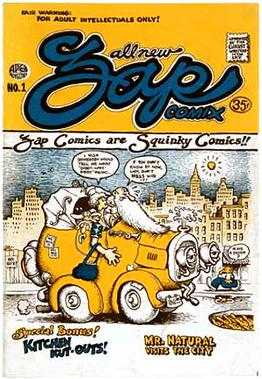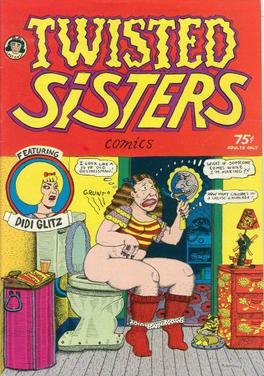
Robert Dennis Crumb is an American cartoonist who often signs his work R. Crumb. His work displays a nostalgia for American folk culture of the late 19th and early 20th centuries, and satire of contemporary American culture.

Underground comix are small press or self-published comic books that are often socially relevant or satirical in nature. They differ from mainstream comics in depicting content forbidden to mainstream publications by the Comics Code Authority, including explicit drug use, sexuality, and violence. They were most popular in the United States in the late 1960s and 1970s, and in the United Kingdom in the 1960s and 1970s.

Kim Deitch is an American cartoonist who was an important figure in the underground comix movement of the 1960s, remaining active in the decades that followed with a variety of books and comics, sometimes using the pseudonym Fowlton Means.

Kitchen Sink Press was a comic book publishing company founded by Denis Kitchen in 1970. Kitchen Sink Press was a pioneering publisher of underground comics, and was also responsible for numerous republications of classic comic strips in hardcover and softcover volumes. One of their best-known products was the first full reprint of Will Eisner's The Spirit—first in magazine format, then in standard comic book format. The company closed in 1999.

Wimmen's Comix, later retitled (respelled) as Wimmin's Comix, is an influential all-female underground comics anthology published from 1972 to 1992. Though it covered a wide range of genres and subject matters, Wimmen's Comix focused more than other anthologies of the time on feminist concerns, homosexuality, sex and politics in general, and autobiographical comics. Wimmen's Comix was a launching pad for many cartoonists' careers, and it inspired other small-press and self-published titles like Twisted Sisters, Dyke Shorts, and Dynamite Damsels.

Trina Robbins was an American cartoonist. She was an early participant in the underground comix movement, and one of the first women in the movement. She co-produced the 1970 underground comic It Ain't Me, Babe, which was the first comic book entirely created by women. She co-founded the Wimmen's Comix collective, wrote for Wonder Woman, and produced adaptations of Dope and The Silver Metal Lover. She was inducted into the Will Eisner Hall of Fame in 2013 and received Eisner Awards in 2017 and 2021.

Denis Kitchen is an American underground cartoonist, publisher, author, agent, and the founder of the Comic Book Legal Defense Fund.

Megaton Man is a satirical superhero created by cartoonist Don Simpson. A parody of the superhero genre, Megaton Man is a gigantically-muscled but dim-witted oaf who starred in Simpson's cheerfully absurd stories.

Michael Terry Gilbert is an American comic book artist and writer who has worked for both mainstream and underground comic book companies.
A comic jam is a creative process where one or more comics artists collaborates on drawing or painting one single comic. Often the process is that one artist creates the first page, and then another artist creates the second, and a third does the next, and so on. There is no script that the artists work from, and the content of the comics is improvised. Any given artist working on a comic jam makes a page based solely on what happened on the previous page. Variations include each artist contributing a single panel, or set of two or three panels, and then passing it on to the next participant. The cartoonists of the seminal underground anthology Zap Comix were known for contributing a jam comic to each issue of Zap from around issue #3 onward.
Jim Mitchell is an American underground cartoonist from Milwaukee. Mitchell was part of the late-1960s/early-1970s Milwaukee underground comix scene and a co-founder of the Krupp Comics/Kitchen Sink group.

John Workman is an American editor, writer, artist, designer, colorist and letterer in the comic book industry. He is known for his frequent partnerships with writer/artist Walter Simonson and also for lettering the entire run of Grant Morrison/Rachel Pollack's Doom Patrol.
Notable events of 1995 in comics.
James Vance was an American comic book writer, author and playwright, best known for his work from Kitchen Sink Press and in particular the lauded Kings in Disguise.

Diane Robin Noomin was an American comics artist associated with the underground comics movement. She is best known for her character DiDi Glitz, who addresses transgressive social issues such as feminism, female masturbation, body image, and miscarriages.
Robert Triptow is an American writer and artist. He is known primarily for creating gay- and bisexual-themed comics and for editing Gay Comix in the 1980s, and he was identified by underground comix pioneer Lee Marrs as "the last of the underground cartoonists."

Donald Richard Donahue was a comic book publisher, operating under the name Apex Novelties, one of the instigators of the underground comix movement in the 1960s.
Leonard Rifas is an American cartoonist, critic, editor, and publisher associated with underground comix, comics journalism, left-wing politics, and the anti-nuclear movement. He is notable for his contributions to the form of minicomics as well as publishing Japanese manga in the United States. Rifas' publishing company, EduComics, operated most actively from 1976 to 1982.

Twisted Sisters is an all-female underground comics anthology put together by Aline Kominsky and Diane Noomin, and published in various iterations. In addition to Kominsky and Noomin, contributors to Twisted Sisters included M. K. Brown, Dame Darcy, Julie Doucet, Debbie Drechsler, Mary Fleener, Phoebe Gloeckner, Krystine Kryttre, Carol Lay, Dori Seda, and Carol Tyler.

Cartoonists Co-op Press was an underground comix publishing cooperative based in San Francisco that operated from 1973 to 1974. It was a self-publishing venture by cartoonists Kim Deitch, Bill Griffith, Jerry Lane, Jay Lynch, Willy Murphy, Diane Noomin, and Art Spiegelman. Cartoonist Justin Green's brother Keith acted as salesman/distributor, and the operation was run out of Griffith's apartment.














